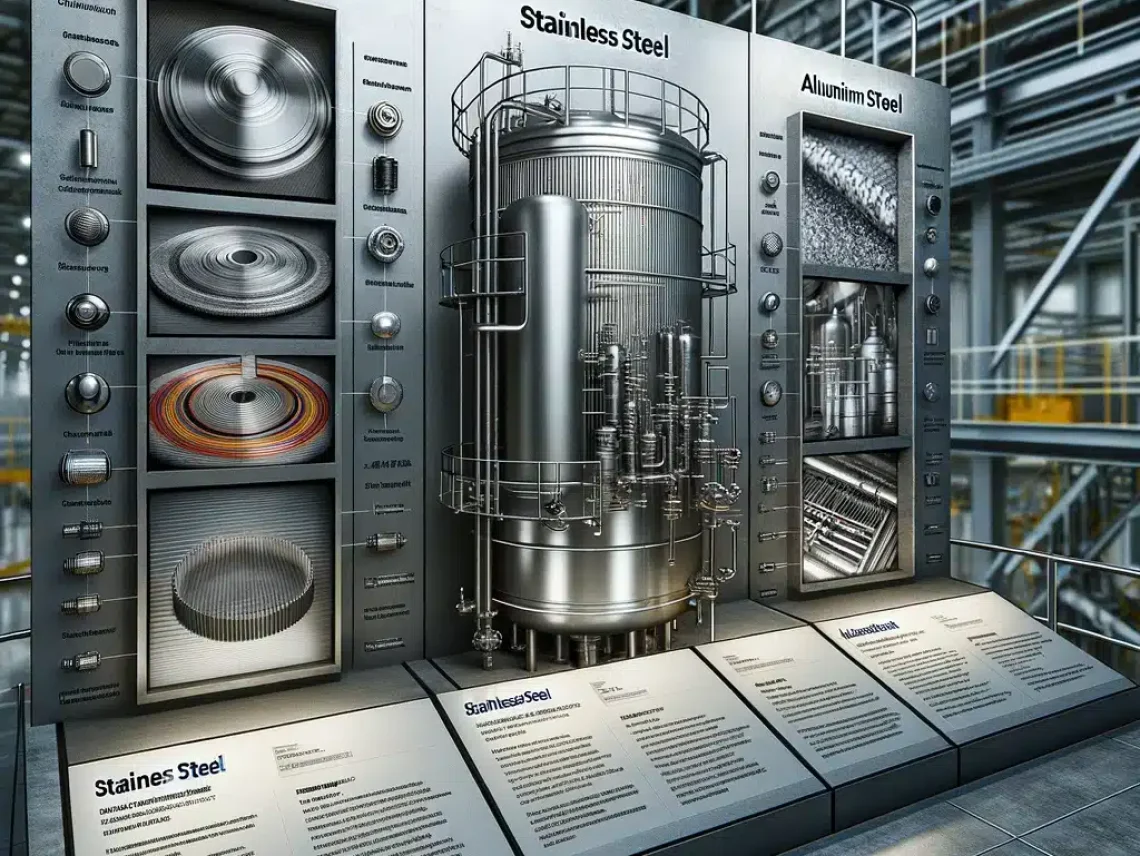
Table of Contents
TogglePressure vessels play a vital role in modern industrial operations. These containers hold gases or liquids under high pressure, ensuring safety and reliability in critical applications. Choosing the right material for constructing pressure vessels maintains their strength, durability, and performance. This article explores the materials commonly used in their fabrication and explains why these materials are selected.
Engineers design pressure vessels to withstand the stress of containing high-pressure substances. These containers serve various industries, such as petrochemical plants and pharmaceutical facilities. Consequently, selecting the appropriate material directly impacts the vessel’s strength, durability, and resistance to corrosion.
Manufacturers select pressure vessel materials based on their operational requirements, including temperature, pressure, and chemical reactivity. For example, common choices include carbon steel, stainless steel, various alloys, and composite materials.
Carbon steel remains a popular choice due to its durability and strength. Furthermore, its ability to handle high pressures at a low cost makes it a reliable option for many applications.
Stainless steel stands out for its corrosion resistance, especially in environments with high exposure to chemicals. Additionally, its chromium-rich alloy composition forms a protective layer that prevents corrosion, making it ideal for industries like food processing and chemicals.
Alloy materials, such as Hastelloy, Inconel, and Monel, are used when a combination of strength, flexibility, and resistance to high temperatures and corrosion is required. These materials are often employed in specialized applications where standard materials would not suffice.
Composite materials are gaining traction as an alternative to traditional metals. Their unique combinations provide superior strength-to-weight ratios and corrosion resistance, making them suitable for certain advanced applications.
Manufacturers use clad materials to combine the benefits of different metals. By layering a strong base material with a corrosion-resistant outer layer, they create pressure vessels optimized for durability and reliability.
Nickel alloys thrive in extreme environments, such as those involving high temperatures and corrosive chemicals. Their exceptional durability makes them indispensable despite their higher costs.
Aluminum’s lightweight properties and excellent thermal conductivity make it a practical choice for vessels requiring mobility and efficient heat transfer.
Engineers rigorously test all materials used in pressure vessel construction to meet standards established by ASME and ISO. These tests ensure that vessels operate safely and efficiently throughout their lifespan. Material selection involves understanding operational requirements and environmental factors, ensuring the chosen material contributes to both safety and efficiency.
Manufacturers typically construct pressure vessels with materials that handle high pressure and temperature. Carbon steel, stainless steel, and alloy steel are the most common choices. For instance, carbon steel is valued for its strength and affordability, while stainless steel resists corrosion effectively.
Material selection largely depends on the application. For chemical plants, stainless steel or nickel alloys provide excellent corrosion resistance. In contrast, high-temperature applications often require materials like chromium-molybdenum steel for thermal stability.
Yes, high-grade alloy steels such as chromium-molybdenum steel excel under extreme conditions. Composite or layered materials can also combine strength and flexibility for specific high-pressure needs.
Material thickness significantly impacts safety and performance. Thicker materials can withstand higher pressures, while overly thick designs may add unnecessary weight and cost. Engineers carefully calculate thickness to balance strength, safety, and cost-effectiveness.
Yes, advancements in metallurgy and composites have introduced new materials. Carbon fiber-based composites and modern steel alloys offer enhanced strength-to-weight ratios and resistance to extreme conditions. Additionally, research into advanced ceramics may further revolutionize the industry.
Table of Contents
ToggleIn the realm of industrial solutions, Red River emerges as a pioneer, offering a diverse range of custom-engineered products and facilities. Among our specialties is the design and production of Custom/OEM Pressure Vessels, meticulously crafted to meet individual client requirements, ensuring performance under various pressure conditions. Our expertise extends to the domain of prefabrication, where Red River leads with distinction.
The company excels in creating prefabricated facilities, modules, and packages, reinforcing its stance as a forerunner in innovation and quality. This proficiency is further mirrored in their Modular Skids offering, where they provide an array of Modular Fabricated Skid Packages and Packaged equipment. Each piece is tailored to client specifications, underlining their commitment to delivering precision and excellence in every project they undertake.